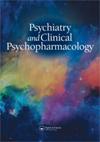Is restless legs syndrome related with depression/anxiety disorders or medications used in these disorders? A cross-sectional, clinic-based study
IF 0.5
4区 医学
Q4 PHARMACOLOGY & PHARMACY
引用次数: 2
Abstract
ABSTRACT Objective: The aim of this study is to investigate the frequency and severity of restless legs syndrome (RLS) in patients diagnosed with depression or anxiety disorder and the relationship of RLS with medications used in these disorders and clinical/sociodemographic characteristics of the patients. Methods: Four hundred and fifty-four consecutive patients who were treated with medication for “Depressive Disorder” or “Anxiety Disorder” in our outpatient clinic were included in the study. Subjects were screened by International Restless Legs Syndrome Study Group (IRLSSG) scale, Hospital Anxiety Depression Scale. Patients who met the criteria of RLS diagnosis due to the RLS screening scale (n = 104) were interviewed in detail. Patients’ laboratory tests were performed to investigate medical conditions other than antidepressant/antipsychotic use known to be related with RLS and 40 (8.8%) of 104 patients were excluded from the study. The main study group consisted of 414 patients. Results: The mean IRLSSG score of 64 patients diagnosed with RLS was 18.95 ± 5.11 (min: 7–max: 29), 7.8% of whom had mild and 55.1% had severe RLS. The incidence of RLS in patients receiving antidepressant treatment (n: 414) was significantly higher than the general population (15.5%). There were no significant difference neither between diagnostic groups (anxiety/ depression) nor individual antidepressants by means of RLS. Patients receiving combined treatment like SSRI + quetiapine, SSRI + mirtazapine or SSRI + trazodone scored 4.7 times higher on RLS scale. Discussion: There was no significant difference by means of RLS diagnosis or severity of RLS in patients with a diagnosis of anxiety/depressive disorder. However antidepressant using patients’ RLS prevalence was higher than general population’s. It was noticed that patients who received combined drug treatment had a 4.7-fold increase in RLS. In conclusion; beginning with as possible as the least number and dose of psychotropic drugs when treating a patient with depression or anxiety disorder does not increase RLS risk as well as providing advantages such as reduced risk of drug interaction and side effects.不宁腿综合征是否与抑郁/焦虑障碍或治疗这些障碍的药物有关?一项基于临床的横断面研究
摘要目的:本研究旨在调查诊断为抑郁或焦虑障碍患者的不宁腿综合征(RLS)的频率和严重程度,以及RLS与这些疾病使用的药物和患者临床/社会人口学特征的关系。方法:在我院门诊连续接受“抑郁障碍”或“焦虑障碍”药物治疗的454例患者纳入研究。采用国际不宁腿综合征研究组(IRLSSG)量表、医院焦虑抑郁量表对受试者进行筛选。通过RLS筛查量表对符合RLS诊断标准的患者(n = 104)进行详细访谈。对患者进行实验室检查,以调查已知与RLS相关的抗抑郁药/抗精神病药使用以外的医疗状况,104例患者中有40例(8.8%)被排除在研究之外。主要研究组由414例患者组成。结果:64例RLS患者的IRLSSG平均评分为18.95±5.11 (min: 7-max: 29),其中轻度RLS占7.8%,重度RLS占55.1%。接受抗抑郁治疗的患者的RLS发生率(n: 414)显著高于普通人群(15.5%)。在诊断组(焦虑/抑郁)和个体抗抑郁药之间通过RLS均无显著差异。接受SSRI +喹硫平、SSRI +米氮平或SSRI +曲唑酮联合治疗的患者在RLS量表上得分高出4.7倍。讨论:在诊断为焦虑/抑郁障碍的患者中,通过RLS诊断或RLS严重程度无显著差异。但使用抗抑郁药的患者的RLS患病率高于普通人群。值得注意的是,接受联合药物治疗的患者的RLS增加了4.7倍。结论;在治疗患有抑郁症或焦虑症的患者时,从尽可能少的数量和剂量的精神药物开始,不仅不会增加睡眠倒睡的风险,而且还提供了诸如减少药物相互作用和副作用的风险等优点。
本文章由计算机程序翻译,如有差异,请以英文原文为准。
求助全文
约1分钟内获得全文
求助全文
来源期刊

Psychiatry and Clinical Psychopharmacology
Medicine-Psychiatry and Mental Health
CiteScore
1.00
自引率
14.30%
发文量
0
期刊介绍:
Psychiatry and Clinical Psychopharmacology aims to reach a national and international audience and will accept submissions from authors worldwide. It gives high priority to original studies of interest to clinicians and scientists in applied and basic neurosciences and related disciplines. Psychiatry and Clinical Psychopharmacology publishes high quality research targeted to specialists, residents and scientists in psychiatry, psychology, neurology, pharmacology, molecular biology, genetics, physiology, neurochemistry, and related sciences.
 求助内容:
求助内容: 应助结果提醒方式:
应助结果提醒方式:


